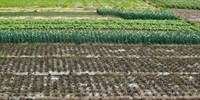
Related
Top stories



ESG & SustainabilitySouth Africa’s carbon tax should stay: climate scientists explain why
Britta Rennkamp et al. 1 hour



More news

















"It is often these farmers that benefit from corporate social investment (CSI) programmes that help them to develop skills and increase outputs. However, the ambitions of becoming a recognised supplier that can compete with larger growers for a piece of the market remains a dream for small-scale farmers," says Diale Mokgojwa, senior manager Enterprise Development at Standard Bank.
But, things are changing. Many farmers that have been able to utilise the lessons learned through CSI support and, through additional interventions, have been able to enter formal markets on their own account. The secret behind their change of fortunes has been the introduction of the farming 'cluster' concept - an approach that has resulted in Standard Bank collaborating with the South African Agri Academy.
"Agriculture is a highly competitive business. The farmer who can produce large quantities of a quality crop on a sustainable basis and get it to the market is more likely to succeed. Getting into this position has been almost impossible for smaller farmers who cannot attain the critical mass required to meet these obligations. In addition they have also been hampered by a lack of business skills required for effective farming," says Mokgojwa.
The cluster development model enables a group of farmers to collaborate on group purchases for input requirements. They then receive the support necessary to produce a single crop, for example garlic, to similar standards on each of their farms. The joint output of the farmers is then aggregated and sold to a client.
"The major benefit for farmers that are being supported by the Agri Academy and Standard Bank is that they do not need market agents to represent them. As a result, they do not have to sell crops at ruling prices at major produce auction markets in competition with major commercial enterprises."
"Instead, with the assistance of the Agri Academy they have been linked directly to retailers. The retailer sets the standards required, specifies volumes and quality, stipulates prices for the crop and even facilitates the collection of the crop."
"By harnessing these advantages the farmers become viable producers of cash crops. Their efforts are more profitable than they were before joining a cluster and the collected tonnages of crops on offer makes their small farms sustainable. The farmers, who operate according to contracts with retailers, also benefit from the reduced costs of being able to enter the agri-business value chain at a higher level than many large-scale commercial farmers," adds Mokgojwa.
"Prices at this value point are often higher for the farmer who does not have to be concerned about agents and other associated costs," says Mokgojwa.
The success of the concept has seen at least one major food processing company establishing a central collection, storage and grading facility for produce. Others have invested in packing sheds where quality inspections take place and the produce is packaged to the retailer's required standards for direct shipment into stores.
Many of the farmers who joined the SA Agri Academy and Standard Bank programme found themselves being occupiers of agricultural land, awarded to them by the government, as part of the land restitution process. Although they had land, the new farmers often did not have the farming skills or financial resources to make their small farms profitable.
The programme saw mentors appointed to assist the farmers through all aspects of production and to teach the financial skills required for farm management. These mentors then follow the farmers through the production cycle. They end their involvement by ensuring that retailers' standards are achieved and adhered to. At this point, inspectors appointed by the retailers start being involved.
Mokgojwa says: "Clusters now exist across South Africa. They produce a vast array of market requirements from garlic and spices through to eggs and chickens. To date, there are 675 members of clusters in all nine provinces. The largest participation occurs in the North West Province's Taung and Vryburg areas, which together account for 306 members."
"There is no doubt that cluster farming is playing a role in opening participation in agri-business to small-holder farmers who, after they become established, also develop into mainstream members of the formal economy and banking system," concludes Mokgojwa.